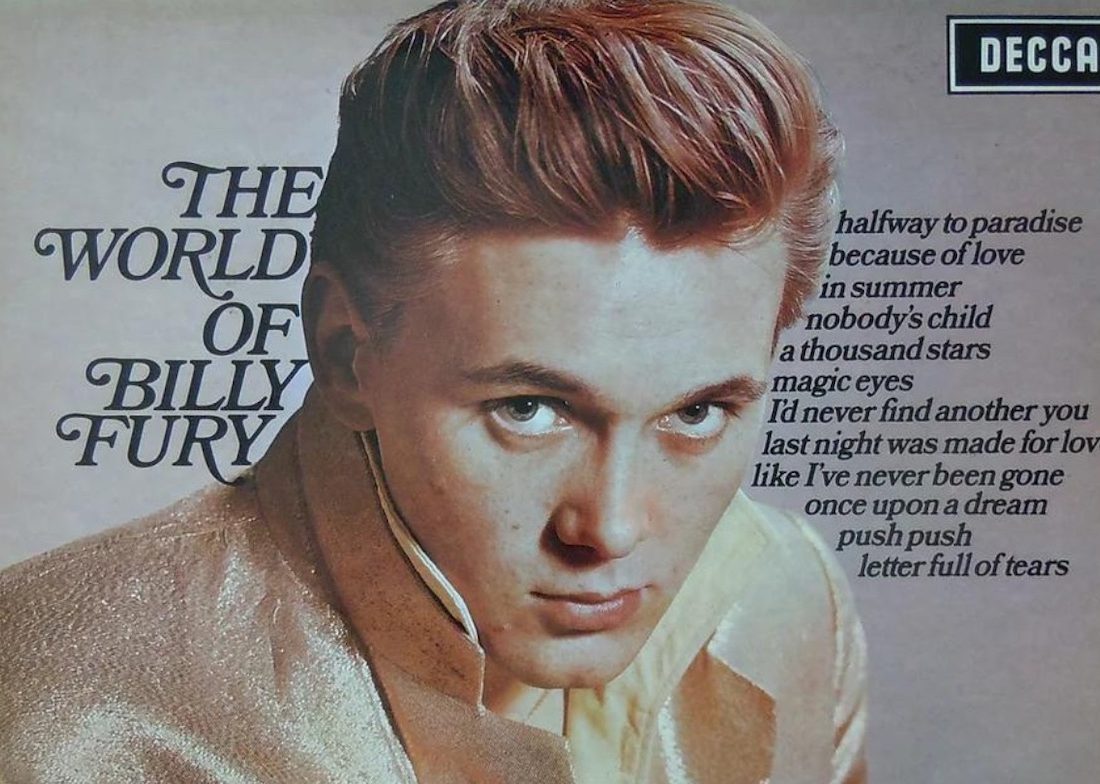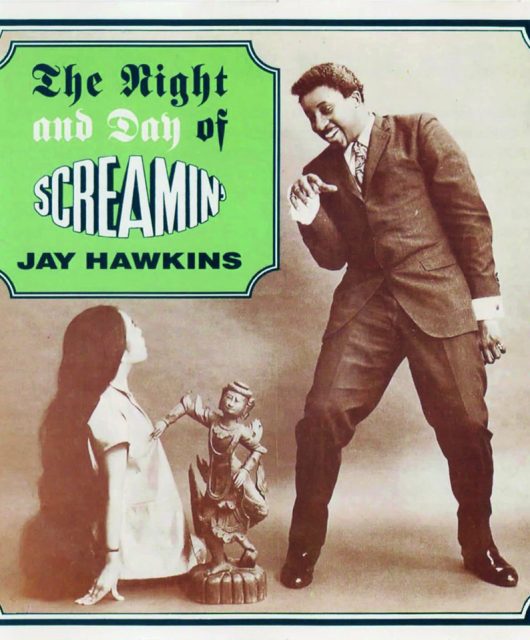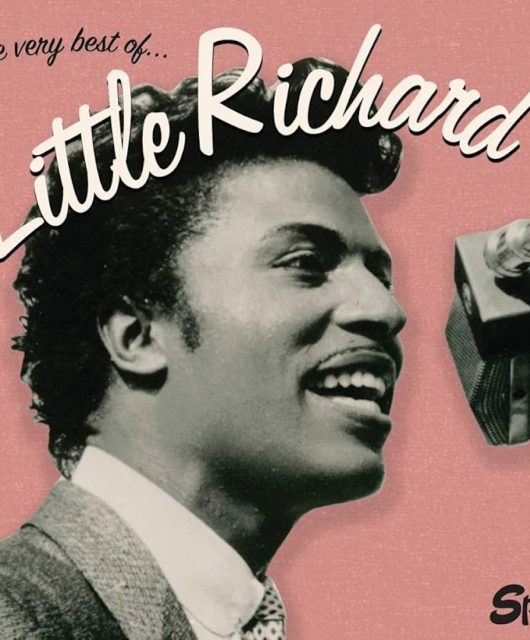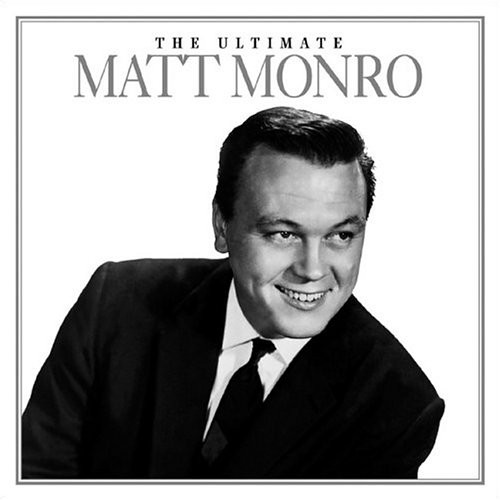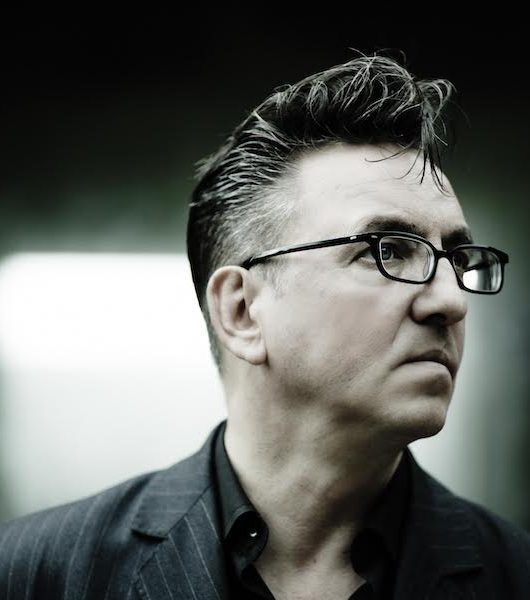We’ll Never Find Another You – The Billy Fury Story
The premature passing of Billy Fury on 28 January 1983, left Britain bereft of one of its brightest ever rock stars. A pioneering pop sensation, whose influence paved the way for future generations of chart-topping UK artists, Fury was a complex character. Behind his striking teen idol style and highly provocative showmanship, existed an unassuming introvert, humbled by the trappings of fame and widespread adoration.
Born Ronald Wycherley on 17 April 1940, the future idol of Britain’s burgeoning rock’n’roll scene worked in the Liverpool docks after leaving school at the age of 15. Inspired by country and western stars such as Hank Williams, who he believed sang “about real life and how it feels when you get let down”, Wycherley started composing and performing his own material at local shows.
In May 1958, he cut a six-track acetate at Percy Phillips’ Sound Recording Services in Liverpool. Laid down just a couple of months prior to The Quarrymen’s now famous visit, the influence of Elvis Presley loomed large with covers of Have I Told You Lately That I Love You, Playing For Keeps, Paralyzed and I’m Left, You’re Right, She’s Gone all featured. The recording also included his self-penned composition, Love’s A-Callin’ (aka The Yodelling Song), which had been influenced by the Slim Whitman number Indian Love Call.
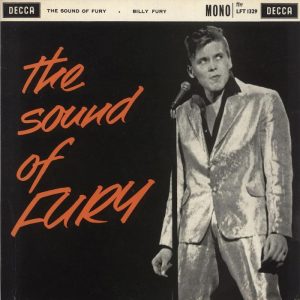
Pop Protégé
After his mother wrote a letter and a copy of the recordings was sent to Larry Parnes, young Wycherley was invited to meet with the UK pop impresario when The Larry Parnes Extravaganza package tour rolled into Birkenhead.
On 1 October 1958, the teenage Teddy Boy rocked up to the Essoldo Theatre, with a headful of songs and a guitar around his neck, hoping to impress the manager and his protégé Marty Wilde. His appearance that evening went on to become the stuff of pop music legend.
“Backstage at the show, Larry brought this lad in and said, ‘This young guy has got some songs he wants to play for you’,” Wilde tells Vintage Rock. “He played me a couple of the numbers he’d written, and I told Larry that I didn’t think it would be fair for me to take them because they were really good. I suggested that Billy sang them himself and Larry took me at my word by pushing him through the curtains right on to the stage in front of the excited audience.
“Poor Billy had no idea that he was going to perform, he wasn’t wearing any stage clothes or makeup, and I think he sang two, maybe three, songs. I’m pretty sure Maybe Tomorrow was one of them. He went down an absolute storm. It was a typical Larry move, but he’d do things like that and turn people into stars… But Billy was a natural star.”
The Parnes Stable
The UK’s premier music manager had previously taken a Bermondsey boy called Thomas Hicks, re-christened him, and established Tommy Steele as Britain’s first rock’n’roller. Inventing names which he thought best reflected a performers’ character, Parnes swiftly formed a celebrated stable of stars.
Alongside the aforementioned Wilde (Reginald Leonard Smith aka Reg Patterson), he created among others, Vince Eager (Roy Taylor), Dickie Pride (Richard Kneller), Lance Fortune (Christopher Morris), Duffy Power (Ray Howard), Johnny Gentle (John Askew), Terry Dene (Terence Williams), Nelson Keene (Malcolm Holland), and Georgie Fame (Clive Powell).
With his rock star potential and undoubted talent, Parnes immediately signed up the handsome Ron Wycherley and it was then that Billy Fury was born.
Wilde says: “I think Billy Fury was a good name for him, and ‘Marty Wilde’ was great for me. It was the making of me in many ways, but I hated it at first, it sounded like some American twit, so it took me a while to get used to it. I can’t speak for Billy, but I’m sure he would have felt the same… I’m sure his mum was in shock just like mine was! While we weren’t softies and didn’t take nonsense from anybody, I don’t think we were particularly wild or furious. He was actually a very shy and quiet man.”
The Sound Of Fury
“Larry could be a real pain, but you had to have your own opinions and not let him take over,” continues Wilde. “I think Billy and I were lucky, we managed to get our own way most of the time. While there was a lot of competition among other artists in the stable, the camaraderie between me and Billy was great.
“I think we were destined to be close friends because of the way I treated him with respect when we first met. He was a great rock’n’roll singer and we were both on the same page. The fame, money and screaming girls was all great fun, but we really bonded over our shared passion for music and what we were doing.
“If you look at those early pictures of Billy, when he’s wearing casual clothes, he looked so cool. There’s a lovely photograph of Billy and I with Jimmy Tarbuck backstage at the Liverpool Empire and Billy effortlessly steals the picture. It’s funny, I’ll sometimes see a new film clip of Billy and it will bring back so many happy memories… when I catch early footage, I realise just how great he really was. Billy was right up there with the very best.”
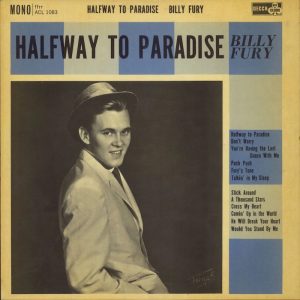
Once Upon A Dream
Fury released his first single for Decca, Maybe Tomorrow, in January 1959 and immediately had a UK Top 20 hit. Within a year, in March 1960, he landed in the UK Top 10 with his self-penned composition, Colette. A steady slew of fine singles then followed, including the brooding Wondrous Place and enchanting A Thousand Stars, before he scored a hat-trick of Top 5 hits with Halfway To Paradise, Jealousy and I’d Never Find Another You.
His debut album, The Sound Of Fury, featuring 10 original numbers credited to either Fury or his pseudonym Wilbur Wilberforce, was released in May 1960 and would go on to be heralded as one of the finest British rock’n’roll albums of all time.
“He was a funny lad and had a childlike quality,” Wilde continues, “but because he was so very shy, some people made a mistake of thinking he wasn’t too bright. He was highly intelligent. I think he was a great writer, and I don’t think he ever realised his full potential because he was always so busy.”
It’s a sentiment echoed by Colin Paul, singer with The Persuaders and one of the organisers of the Billy Fury Weekends: “Writing his own songs was something nobody else was really doing and wouldn’t do until a few years later when The Beatles came along. Billy was a genius and I believe he wrote from the heart. Every song touched you. Even the songs he wrote later in life had that personal feel. I guess you could say it was like he was singing directly to you. Hearing his voice for the first time, when I was around 14, left such a lasting impression on me. That sound still sends shivers down my spine.”
Halfway To Paradise
Initially backed by Georgie Fame & The Blue Flames, Parnes held auditions in Liverpool for a new supporting group. The Silver Beetles, who later dropped the ‘Silver’ and became The Beatles, tried out for Billy, before The Tornados landed the gig.
Drummer Clem Cattini tells Vintage Rock: “I originally worked with Billy at the end of the 50s before we’d formed The Tornados. Back then we were called The Beat Boys and played with a number of Larry’s acts. I left Larry to work with Johnny Kidd & The Pirates but returned once The Tornados had formed. It was our bassist, Heinz Burt, who approached Billy to work with him again. Billy was really pleased because he saw it as a reunion.
“Billy was a nice guy and one of the boys. There were no motorways back then and we had to travel everywhere – from Edinburgh to the Isle of Wight – by coach. Billy travelled with everyone else and slept in the same hotels – although most of the time we couldn’t afford hotels, so we’d sleep in the coach.
Universal Appeal
“Parnes’ management style was very similar to Colonel Tom Parker in many ways – Billy was paid £50 a week and we got £25, but to be fair Larry did put all those shows on and put a lot of money back into the business. We never really had time for any crazy shenanigans on the road. We’d arrive at a town or city, go on stage, play our set, come off stage and head back to the coach. We’d get up in the morning, go to the local baths for a wash, and then head off to the next gig… it was far from a glamorous rock’n’roll lifestyle!
“While he was one of the lads, he was also quite introverted. However, on stage he was a completely different guy and such a great performer. When we played those upbeat numbers and Billy struck a pose, the audience went crazy. We got banned in Ireland after Billy did an Elvis wiggle. The management said, ‘If you do that again, we’ll pull the curtain down on you’, so the next night as soon as Billy wiggled his bum the curtain came down on us and they cancelled the whole tour. We had to sit in Ireland for five days doing nothing.
“There was also this time in Scotland when a big Scotsman in the audience took exception and said, ‘You wiggle your arse again and I’ll do you in’. When we finished playing, Billy ran off the stage and I fortunately got my drumkit in the doorway to stop the burly fella getting hold of Billy. But that was a rare occasion – I think the boys liked him as well as the girls, because he was so rock’n’roll.”
Playing It Cool
Styled on the Elvis’ movies, Billy Fury made his big-screen debut in 1962’s Play It Cool, directed by a young Michael Winner. The filmmaker later admitted that directing Fury at Pinewood Studios was his first break into feature motion pictures. Initially snubbed by agents and bookers the film was trialed in just three cinemas yet the response from the kids was overwhelming. As Winner admitted in the BBC’s Omnibus: ‘Halfway To Paradise’ documentary: “It was obvious they adored him.”
The movie sees Fury star as Billy Universe opposite the likes of Bobby Vee, Shane Fenton and Helen Shapiro, who had scored Top 3 hits with all four of her first UK singles. Fury’s rendition of Once Upon A Dream was the only track from the film to chart when it peaked at No.7 in August ’62.
Play It Cool was a flimsy affair and when asked if he had plans for any more movies, Fury politely responded that it would be another musical, “hopefully with a bit more story”. His next cinematic outing, 1965’s I’ve Got A Horse, would embrace the star’s love of animals. The semi-autobiographical tale, co-written by Larry Parnes, featured Fury’s own horse, Anselmo, who had raced in the 1964 Epsom Derby and finished fourth. An off-screen romance blossomed between Fury and co-star Amanda Barrie, but the relationship wouldn’t go the distance.
We Want Billy!
In 1963, The Tornados recorded We Want Billy! – one of the first live albums released in the UK – which featured Fury originals alongside popular covers such as Sweet Little Sixteen, That’s All Right and Unchain My Heart.
Cattini continues: “We Want Billy! was cut at Decca with an invited audience but you couldn’t hear any of the music because of all the screams. It had to be edited to reduce the shrieks – that’s the sort of effect he had. It was like going to a Beatles concert, but the likes of Billy and Marty Wilde, generated that hysteria years before they arrived.
“Billy and Marty paved the way for bands like The Beatles, but when they came along, they changed the scene completely… Cliff had a bad time, The Shadows had a bad time, all the big acts had a bad time. I can remember playing in Liverpool with Billy and The Beatles would always come and ask if they could say hello to him, they were huge fans.”
Wilde adds: “We loved The Beatles. But when they became the hot new things on the scene, things didn’t go too great for any of us. I’ll never forget the time Billy and I turned up to play a show and our names were written in biro on a piece of paper and stuck on the window of the door. It got that bloody bad [laughs].”
“We eventually split with Billy because of arguments between The Tornados’ management and Larry,” reveals Cattini. “We were contracted to gig for Parnes and he wouldn’t let us go and play the States. However, I really enjoyed working with Billy, he was an easy-going, gentle guy… But he was never a well boy.”
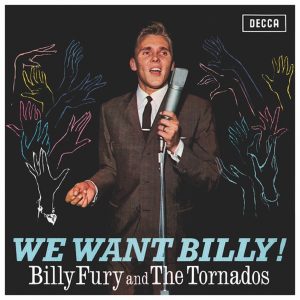
Cross My Heart
As a child Billy had suffered with rheumatic fever which damaged his heart and led to recurrent poor health. Having experienced many prolonged periods in hospital throughout his childhood, it has been reported that, during one stay, he overheard a doctor tell his mother he might not live to be 30. He’d go on to share with loved ones that he expected to die young. “Billy always said he wouldn’t live to an old age,” Marty Wilde remembers. “I’d tell him not to be so daft, but I think he had already accepted that he wouldn’t.”
Fury’s heart problems continued to plague him into his 20s. While 1961 through to 1965 would prove to be Billy’s best years for chart success, with Last Night Was Made For Love, Once Upon A Dream, Like I’ve Never Been Gone, When Will You Say I Love You, In Summer, It’s Only Make Believe and In Thoughts Of You all reaching the Top 10, his affliction meant he would have to cut some performances short or be removed entirely from certain engagements.
Fans were told that he was suffering from exhaustion or flu, but by the 70s his health had deteriorated so dramatically that the singer eventually needed to undergo two critical heart operations to repair and replace damaged valves.
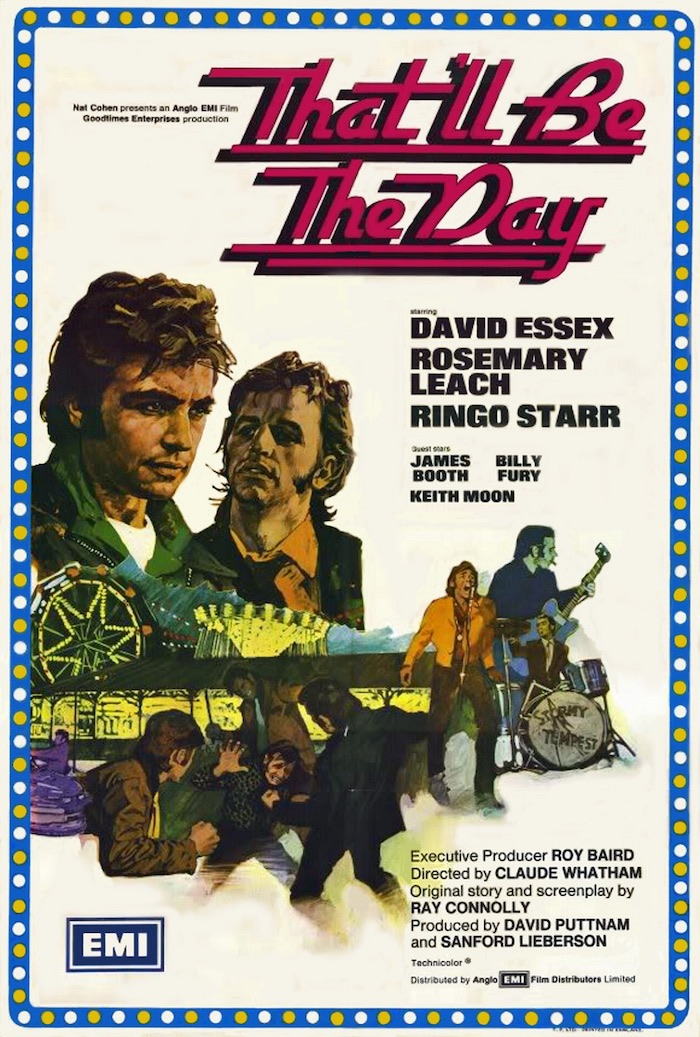
Long Live Rock
On 5 August 1972, months after his first major treatment, Fury appeared at The London Rock & Roll Show at Wembley Stadium alongside his heroes Jerry Lee Lewis, Little Richard, Bill Haley And His Comets and Chuck Berry. Graham Fenton, from show openers The Houseshakers, says: “Backstage, I went around all the dressing rooms, and was thrilled to bits to meet Billy as I’d long admired him. In the UK we had Cliff Richard, who was a sharp-looking fella, but when Billy came along, we really had someone who could rival Elvis Presley or Eddie Cochran.
“He was so excited about the show and all the legendary artists who were starring on the bill. He was such a warm character and I thought he appeared to be in good health. However, a few years later, when I saw him on the television, I got pretty upset by how thin he was looking… you could see he wasn’t well.”
In 1973, Fury bounced back from a period of semi-retirement to feature as Stormy Tempest in the drama That’ll Be The Day, starring David Essex. The tie-in double LP, which featured Fury on five tracks, topped the UK albums chart for seven weeks.
However, it dramatically dropped out of sight for the week ending 18 August 1973, when all compilations listed as ‘various artists’ were no longer eligible. However, Fury’s hot takes on Long Live Rock and What Did I Say, highlight just how rollickingly good his voice still was during this time.
Don’t Say It’s Over
Wilde continues: “Billy was a guest when I was the subject of This Is Your Life in 1982. I was delighted to see him but when I gave him a hug, I could feel how much weight he had lost. I knew something was wrong. He would spend many weekends with me and my wife, Joyce. Billy was a keen ornithologist and adored animals, disappearing into the forest opposite our home for hours. He was so happy birdwatching. Joyce and I tried to get him better and I wish he had stopped working for a little while and rested more…”
Despite his frailty, it appeared that a comeback might have been on the cards for Fury in the early 80s, when he entered the studio to cut a new album entitled The One And Only with Stuart Colman. “Billy wasn’t well,” the producer told Spencer Leigh, author of Fury biographies Halfway To Paradise, Britpop 1955-1962 and Wondrous Face: The Billy Fury Story. “His voice was immaculate, and he was in wonderful form. When we cut Devil Or Angel, Billy said: ‘I didn’t think I could sing like that anymore’.”
Released as a single in November 1982, his cover of The Clovers’ sumptuous R&B classic, which had previously been a US 1960 hit for Bobby Vee, sadly barely registered for Fury, peaking at No.58 in the UK charts. Two months later, in the early hours of 28 January, Fury collapsed following a heart attack at his home in London. He was taken to St Mary’s Hospital but died later that afternoon, aged 42.
In Thoughts Of You
“I’d been on the road with my daughter Kim in Europe,” remembers Wilde. “When we arrived back at Heathrow, we heard the news. We were all devastated… he always knew he wouldn’t last, and it’s so sad that he was right. But he had a great career and loved his life. He met Elvis, which is more than I ever bloody did!”
“I think Billy would have loved the ongoing appreciation for him and the music he created, it’s always nice to think you’ve left a positive mark,” reflects Cattini. “I don’t think Billy or Marty get enough credit for being the pioneers of rock’n’roll over here. Their legacy should be a lot greater.”
On the anniversary of his passing, a statue of Billy located by the Piermaster’s House in the Albert Dock area of Liverpool, will be the focal point for Fury fans from around the globe to gather and pay tribute to the much-missed star.
The £44,000 bronze sculpture was revealed at the National Museum of Liverpool Life on 19 April 2003. Crafted by artist Tom Murphy, the memorial was donated by The Sound of Fury Fan Club after dedicated followers raised the funds. Tribute performer Colin Paul, who attended the event, said: “I imagine Billy must have been so proud looking down on us all.”
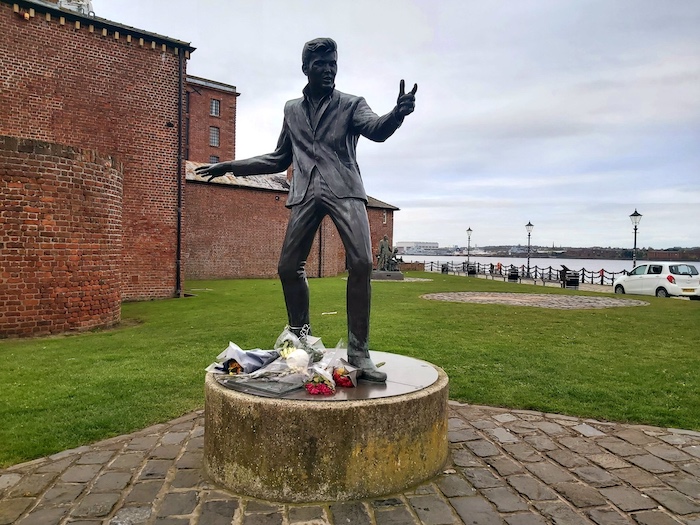
Like I’ve Never Been Gone
“Billy showed me and countless others that anything can be achieved,” continued Paul. He influenced so many of the stars that came after – The Beatles, David Bowie, The Smiths – and proved anyone, from all walks of life, could get out there and make something of themselves. From the beginning, his music struck a chord and I know that I’m not alone.
“There is something about his voice that appeals to all… and when I say all, I really do mean all. We have fans from all ages attend our events and I believe Billy’s legacy will go on. I don’t think he would believe that after all these years, fans would still gather to honour him. Billy’s legacy is his music, and it lives on in all of us.”
Marty Wilde adds: “No matter what happens and how much musical tastes evolve, that statue of Billy will always remain. Maybe, in a hundred years’ time, Billy might be regarded as a local folk story, but for now he is very much revered and so fondly remembered. Liverpool is such a passionate city, full of very proud people, and they will always keep Billy’s name alive.
“I wish he could be doing what I’m doing now. It’s lovely to go out on tour and have people pat you on the back and say nice things. It’s such a tragedy that he never got to experience all this later in his life. He has such a devoted following, and he would have appreciated it all so much. People will always love Billy.”
For more on Billy Fury visit the Billy Fury Archive here
Enjoy this article? Check out The Beatles – Going Deutsch
Subscribe To Vintage Rock Magazine Here

